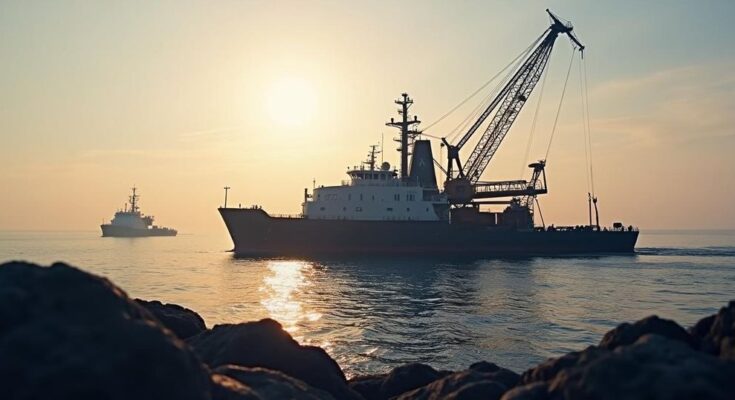Turkish President Recep Tayyip Erdoğan launched the Oruç Reis seismic research vessel for a mission to Somalia, following an agreement for energy exploration in the region. The vessel is protected by two frigates and will conduct extensive seismic surveys critical for identifying potential drilling sites. This operation reflects Turkey’s growing strategic interests in Africa and its commitment to securing energy resources amidst ongoing geopolitical tensions.
On October 5, 2024, Turkish President Recep Tayyip Erdoğan officiated a send-off ceremony for the Oruç Reis seismic research vessel as it embarked on a mission to Somalia. This initiative follows a collaboration established between Turkey’s Ministry of Energy and Natural Resources and Somalia’s Ministry of Petroleum and Mineral Resources through an agreement signed in March 2024, which encompasses both onshore and offshore exploration initiatives within Somalia. Accompanying the Oruç Reis, two G-class frigates—TCG Gediz and TCG Gokova—will provide essential naval protection during this operation. These frigates, modern adaptations of the Oliver Hazard Perry-class, have undergone significant upgrades, including the implementation of sophisticated systems such as the GENESIS combat management system to enhance their operational efficiency in challenging maritime contexts. This mission signifies Turkey’s strategic engagement in the Horn of Africa, where it has obtained exploration rights spanning a 15,000-square-kilometer maritime area adjacent to Somalia. The Oruç Reis is set to conduct three-dimensional seismic surveys over approximately seven months, with the data acquired being pivotal for identifying potential drilling sites for future energy extraction activities. Importantly, the deployment of Turkish naval forces illustrates Ankara’s steadfast commitment to protecting its energy pursuits, particularly in regions plagued by security challenges, including piracy and regional strife. Moreover, this operation bolsters Turkey’s expanding influence in Africa and reflects its ambitions to secure energy resources beyond the Mediterranean, where the Oruç Reis had previously engaged in contentious exploratory activities.
The Oruç Reis vessel has been at the forefront of numerous controversial explorations, particularly in the Eastern Mediterranean, a region where Turkey’s pursuit of energy resources has led to direct confrontations with neighboring states such as Greece and Cyprus. The disputes primarily arise from competing claims to Exclusive Economic Zones (EEZs) in the resource-abundant Eastern Mediterranean. Turkey’s contentious exploration endeavors commenced in 2020, focusing on regions surrounding the Greek island of Kastellorizo, which both nations assert rights to based on differing interpretations of maritime boundaries. Turkey maintains that islands should not have full EEZs, diverging from claims made by Greece and Cyprus, which are grounded in the United Nations Convention on the Law of the Sea (UNCLOS). Turkey is not a signatory to UNCLOS and advocates for a more adaptable approach to maritime delimitation to advance its territorial interests in the area. These operational confrontations have exacerbated tensions between Turkey and Greece, resulting in military mobilizations, diplomatic protests, and calls from the European Union for punitive measures against Turkey. Instances of near-military engagements between Turkish and Greek naval forces have been reported, leading NATO to intervene to establish a deconfliction mechanism aimed at averting inadvertent clashes between these two allied countries.
In conclusion, the deployment of the Oruç Reis seismic research vessel to Somalia marks a significant step in Turkey’s strategic pursuit of energy resources and expansion of its influence in Africa. This operation follows a new agreement with Somalia aimed at energy exploration and underscores Turkey’s commitment to safeguarding its maritime interests despite previous challenges in the Eastern Mediterranean. The involvement of naval frigates further emphasizes the importance of security in Turkish operations as it seeks to navigate complex geopolitical waters both at home and abroad.
Original Source: www.armyrecognition.com




